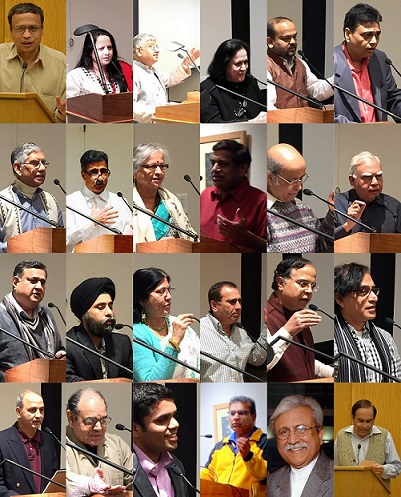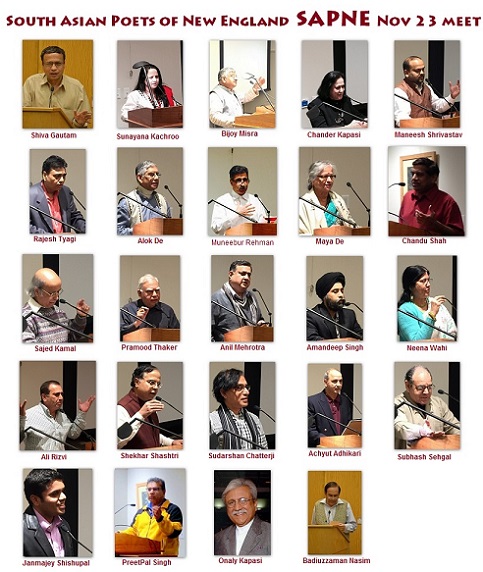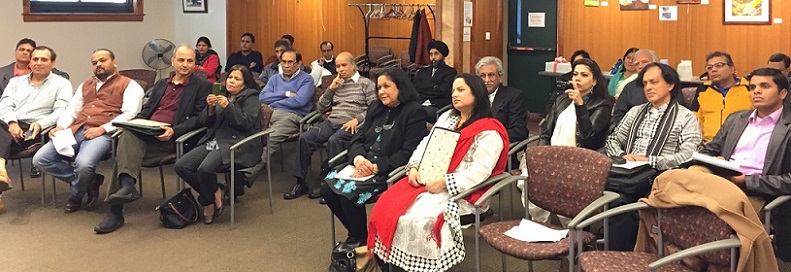Contribute
| From Vedic Singing To Diwali’s Puranpoli – South Asian Poets Warm Up Lexington Library |
Janmejay Shishupal
12/04/2014
Fall came in with the change of colors and a feeling of change. Mother Earth changed her axis, wind got a bit colder, and the sun appeared a little brighter. With the setting, South Asian Poets of New England (SAPNE) convened its quarterly Fall poetry meet. It was held at Cary Memorial Library in Lexington, MA. Twenty four poets of a variety of languages participated in the reading. About forty persons filled the large Meeting Room in the library. The logistics were arranged through the efforts of Syed Ali Rizvi and Chandrakant Shah. The meeting began at 2:20 PM.
Dr. Bijoy Misra initiated the annual India Poetry Reading at Harvard and acts as the convener of the SAPNE meetings. In his opening remarks, he said: “While South Asian Poetry is melodious and intimate, we need to create a voice through it in order to communicate to the public and the youth. We have to choose our medium; and bring style, poise and lyricism in translating our material to help integrate with cultures from other regionsâ€. For the meeting he advised that poets may take their turn as appropriate, marking that they are adding a flower to a garland. The procedure worked. More than two hours of colorful poetry followed. There was a spectacular word garland!
Dr. Sudarshan Chatterjee, a student in Sanskrit and a physician sang the Vedic hymn “madhuvÄtÄ á¹›tÄyate†put to music by him. He was followed by the young Kashmiri poet Sunayana Kachroo, who brought sufi ideas into the troubles of Kashmir which was compounded with the floods last summer. Her lyrical rendering brought the Kashmir valley to the memory. Dr. Onaly Kapasi read from his newly published book “Mind’s Eyeâ€. “Is that God?†looked for names, existence and love for god while reflecting events in a funeral. In a second poem “Nastikâ€- “non-believerâ€, he compared the qualities of people.
Dr. Bijoy Misra followed. He read an English poem “My Father†as a metaphor to the fathers in the world. A father has many roles and we look for fathers everywhere. He reflected that one’s inner spirit in indeed one’s father. Dr. Chander Kapasi suitably followed with a poem from her husband’s book with the theme of “Mother.†The poet searches everywhere and discovers heaven only at the mother’s feet. She read a second poem “Inter-dependence†that explained poet’s journey in life and among the family members. Life indeed is a story of inter-dependence.
Maneesh Srivastava followed with a sentimental poem in Hindi as a tribute to his mother “Tum ho to hum hai Ma†“Mother, we exist when you existâ€. A mother is one’s strength and inspiration. He read a second poem “Gulistan Piche Chut Gaya†“The gardens were left behind†as an immigrant’s recollection of the old country. Rajesh Tyagi, added to the melancholy with a sentimental poem sung in melody. “Yadein kho rahi hai†“Memories are troublingâ€. The poet recalled the festivals, life experiences, and play among the brothers. He settled thoughts with the the changes in life events in time.
Alok De, a senior Bengali poet, read a poem entitled “Parivartan†(Change) in Bengali. The Poet reflected on the constant nature of change that happens everywhere including the earth and galaxy. He wondered if the change is a necessary function of time. Dr. Muneebur Rahman, a Kahmiri poet, followed with a poem with the title “Shabnam†(Dew). The poet continued the theme of change with life and death. He read another poem that expressed the longing for God. Wandering places the poet returns to his own heart and does find answer to his quest.
Maya De, who has been a regular participant, presented two poems in Bengali. The first poem talked about the change with the evolution of Kolkata. In the second poem she talked about her first train-ride from Banaras to Mughalsarai (in India). The poet noted about the iron swing that she played all day; she did not leave in spite of being dizzy. She wondered if life gets us emotionally stuck as the swing. Dr. Sajed Kamal, also a regular participant, followed with a very intense and heart touching poem describing a bomb blast on a street. A bloodied body of a child, symbolizing the universal “Every face,†“Everywhere,†called out to the poet “What did I do?†In a second poem “Mission: Peace,†the poet told all: let bombs be replaced by poems deployed across the Earth by a million doves of peace.
Pramod Thaker, who writes under the pen-name Krishnaditya, connected with an energetic recitation in Gujarati entitled “Jago†(Awake). The poet forcefully called on the winds of unity and fearlessness to awake through love, courage and hope. Anil Mehrotra read two interesting poems. In the first, the poet becomes an observer of life and sees life completely opposite. As a thought, there was love from the enemies, contentment, abundance and peace. His second poem explained the journey of his life with his daughter and his paternal blessings showered on her.
Preetpal Singh had missed the meetings for a few years. He recouped with words and humor with a Punjabi poem making a contrast of life in the US and in Punjab. The metaphors brought comedy to the afternoon. The poet ended with a stanza of recollection to the motherland. Nasim Badiuzzaman, who writes pithy Bengali short poems, had another brilliant composition. The poet talks to his partner that they are the only two people who matter, but the door gets shut as a nature’s play.
Chandu Shah who is popular for his poems with the blue jeans, continued with the theme of love. In his almost extempore Gujarati poem he reflected on the articles in pant pockets discovered in washing. Memories of love are stored in small icons. Amandeep Singh, followed with a sweet Punjabi poem “Questâ€. He wondered about the purpose of existence in this world. While desperate, he discovered that many universes exist beyond the stars. He consoled himself not to lose hope.
Neena Wahi, read a poem “Deepawaliâ€. The poet lamented how the times have changed that the old stories do not hold any more. Home exists, but no love. Brothers exist, but no sincerity. The old stories from grandmothers are not to be heard! Ali Rizvi, known for his two liners (Shayari) quipped in with multiple stanzas from various poets that dealt with immigrant issues, religions, role of seniors, courage and honesty. It was entertaining.
Shekhar Shastri, read an Urdu poem “Eternal Momentâ€. The poem expressed the difference that the poets experience in young and old age connected with love, company, loneliness and desires. Dr. Sudarshan Chatterjee, read the poem “Red Yellow and Greenâ€. This poem explained identity in autumnal colors. “Red†does stay red.
Continued on the theme of nature, Achyut Adhikari read a poem in Nepali entitled “Leaf.†The poem was symbolic with spiritual leanings. A leaf, though ordinary, is offered to the deities, and Lord’s name gets written on it. The mood changed to modernity with Subhash Sehgal presenting a poem “Kora Chittha†in Hindi. The poem focused on the ills of the capitalism. The poet commented on globalization, capitalism, poverty and pollution. In a second poem he parodied “America†as “Amir-Kaâ€, “the land of the capitalists.â€
Dr. Shiva Gautam, a reflective poet in Nepali, made observations on the Vedas. With interest in music he thought a line like “Nishabdo Ma Samgeetam Gamaya†could be an addition to the Vedic stanzas. Finally Janmejay Shishupal, the current recorder, presented a Hindi poem “Puranpoliâ€, based on the festival of Diwali. The poet expressed his love for mother’s home made food cooked during Diwali. He expressed his Diwali best wishes and concluded with a prayer.
Dr. Bijoy Misra thanked all for an extremely thoughtful and literary afternoon. There were snacks and juice for the participants. The next SAPNE meeting will be in February, 2015. The date will be announced after a location is selected. With joyfulness in all, the meeting ended at 4:45 PM.
You may also access this article through our web-site http://www.lokvani.com/


